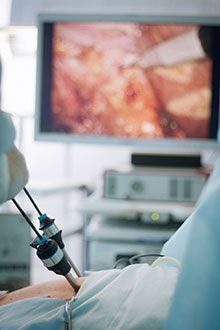Surgery, quality also passes from laparoscopy
In Italy, the adoption of minimally invasive or laparoscopic surgical procedures is still limited – this practice could be fundamental to ensure quality and sustainability for the health system – The recipe of Italian surgeons from the 36th National Congress of the Italian Hospital Surgeons Association (Acii), in progress in Montesilvano (Pescara) – The experience of the British Nice that between 2006 and 2010 brought the laparoscopic interventions for colorectal surgery from 5 to 33 percent
Montesilvano, 22 May 2017 – The progressive increase in the life expectancy and the altitude of Over 65 is one of the main factors that determines and will increasingly determine the socio-economic scenario. Those who come out of the production cycle constitute an increasingly wide population of the population with availability of resources and time, in search of health and well -being, with important expectations with respect to the quality and level of services. At the same time, the growth of chronic diseases and comorbidities, if not adequately addressed and managed, translates into an increase in access to health facilities and in the demand for clinical and care capacities.
In addition, a third factor – pharmacological and technological innovation – tends to show more and more impact year after year. For healthcare, therefore, it is time to face a challenge between the growth in the number, complexity and level of services to be provided, with a consequent increase in the expenditure to be financed, and the request for assistance and services of ever higher quality.
In other words, the challenge is: how to guarantee the quality and sustainability of the healthcare system.
“Surgery can be considered a paradigm of this challenge, a discipline always at the forefront of innovation, with an eye to the development of increasingly sophisticated intervention techniques and strategies, think, for example, of the increasingly widespread use of robots, and which have a less invasive impact for the patient, hence the consolidation of minimally invasive procedures with their obvious advantages”, underlines Diego Piazza, President of Acoi – Association of Italian hospital surgeons.
These themes are at the center of the 36th Acoi National Congress, in progress in Montesilvano (Pescara), entitled ‘The strength of unity: sustainability, technological evolution and role of scientific society’. The goal of the congress – Piazza explains – “It consists primarily in offering a professional updating path, in the field of minimally invasive surgery and new technologies. Today, the scientific society, both ours and the Italian Society of Surgery (Sic), also wants to be a credible interlocutor in facing the theme of the protection of the surgeon and his profession, as well as the management of communication between surgeon and patient, safety in the operating room and medical liability in the use of new devices.”An interlocutor, according to the square, that it is the” engine of quality production in health “, the latter objective of the institutions, such as the Ministry of Health, committed to guaranteeing quality in the care processes through the training of professionals, with finalization of structured accreditation paths, to which “Acii actively contributes”.
A specific example comes from the Op2IMISE program (Open To Innovative Minimally Invasive Surgery Experience), developed in the context of the minimally invasive approach for colorectal surgery and presented in the session “Quality in healthcare”, created thanks to the non-conditioning contribution of Medtronic Italia, which supports this project promoted by Acoi, Sic and the Bicocca University of Milan. “The minimally invasive or laparoscopic approach – says Pierluigi Marini, Director of UOC Surgery 1 at the San Camillo hospital in Rome – allows on the one hand a less bloody impact on the patient, with obvious benefits for the quality of his postoperative recovery, on the other organizational and economic aspects above all linked to less hospitalization, with the possibility of freeing up resources and with lower costs for the healthcare system.”
In Italy, the use of these techniques is still infrequent. According to the National Program (PNE) of the National Agency for Regional Health Services (AGENAS), the use of laparoscopy in the colonation to the colon takes place in 32 percent of cases and in the rectum in 40 percent, “goes Considering, however, that the national figure could be optimistic, since a procedure started with laparoscopic technique could undergo a conversion into traditional surgery, during the course of the intervention “, suggests Marini.
The Op2IMISE project “can be considered a pilot experience aimed at promoting correct training of the surgeon in the use of minimally invasive techniques compared to traditional ones – continues Marini. The ultimate goal is to develop, also thanks to the identification of specific performance indicators, a series of recommendations, on which we are working together with 15 other talented colleagues, to encourage the dissemination of these procedures, demonstrating that, in addition to the already known and positive clinical evidence, there is also equally significant evidence from the point of view of health economics.” A similar experience conducted in Great Britain under the aegis of NICE (National Institute for Clinical Excellence) has meant that between 2006 and 2010 the number of colorectal operations conducted by laparoscopy rose from 5 to 33 percent , an increase of more than 5 times.
“This is a major project that will benefit surgeons as much as patients – Piazza concludes -. We are talking about surgical practices that bring an evident benefit to the individual, improving the entire postoperative course, and great advantages for the system. Unfortunately, to date, there has been no health policy capable of promoting the adoption of minimally invasive procedures, especially, but not only, in the colorectal segment. It is therefore natural that once our part has been done, the ball should pass to the political decision-makers, who we hope will want to do theirs.”


